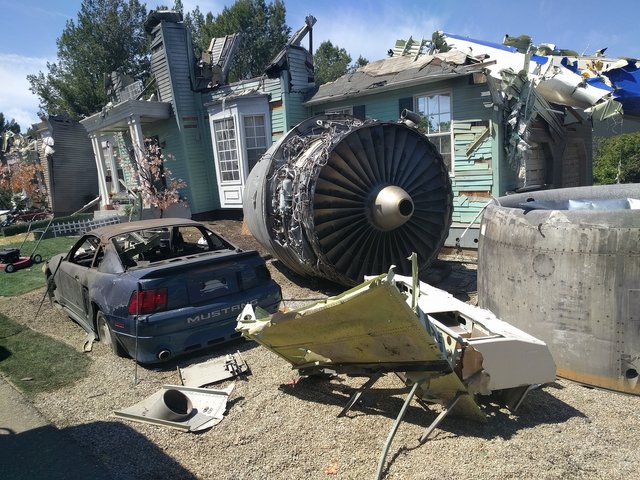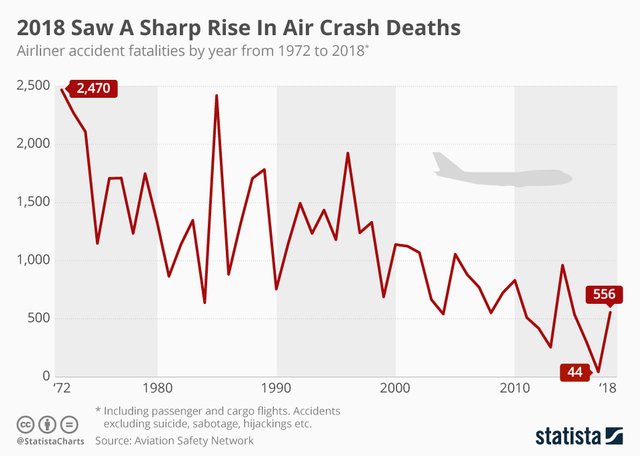Why are air accidents increasing? - Perchè gli incidenti aerei stanno aumentando? [EN]-[ITA]

 |  |
|---|---|
| Factual data are starting to demonstrate that in 2018 the rate of air accidents started to increase again. This is simply a fact but if this trend will remain as it is we must reconsider the myth of air travel being the safest transportation method. Some analysts sustain that this bullish trend should be the effect of modern low fares airlines systems, mainly based on the assumption that people get what they pay for: low cost can lead to low safety. This is a very radical position that is not completely similar to my one but there are a lot of evidences that correlate an aggressive business model and its problematic environment to the sometime tragic outcome of some flights. Simplifying, tired personnel can choose to adopt some kind of shortcuts and this is not the best way to take when operating with modern aircraft. In the last two decades the International Civil Aviation Organization (ICAO) adopted a new approach about safety issues. This new way to deal is mainly focuses on concepts generally known as "human factors". In the ICAO document 9683 has been reported that "If the accident rate is to be decreased, Human Factors issues in aviation must be better understood and Human Factors knowledge more broadly and proactively applied". It was 1998. Since then these kind of topics were used by airlines (at least by the ones I know from inside) more as a discharge of responsibilities than a real growing opportunity: sometimes we found operators and unions using some basic concepts of "human factors" in order to justify political actions or even agreements with unions. If ICAO was right with the above reported statement, and this is still to be demonstrated, the evidence suggests at least that the implementation of these concepts is not effective. | Gli ultimi dati disponibili dimostrano che nel 2018 il rateo degli incidenti aerei sta ricominciando ad aumentare. Questo è semplicemente un fatto ma se questo trend rimanesse per qualche tempo dovremmo rivedere il mito diffuso del trasporto aereo come forma più sicura di spostamento. Alcuni analisti addirittura suggeriscono come il modello di business "low cost" abbia qualche responsabilità a questo riguardo specialmente perchè tende a sfruttare aggressivamente il mercato creando un ambiente ostico per il personale che, quando è affaticato, potrebbe agire prendendo delle "scorciatoie" che sarebbero da evitare quando si ha a che fare con gli aeromobili moderni. L'accoppiamento basso costo - bassa sicurezza è abbastanza comprensibile in un settore nel quale si ottiene in proporzione di quanto si paga ma è una visione un po'radicale che si discosta un po' dalla mia. Nelle ultime due decadi l'Organizzazione per l'Aviazione Civile Internazionale (ICAO) ha adottato un nuovo approccio a queste tematiche: il nocciolo è generalmente legato a concetti come il cosiddetto "fattore umano". Nel suo documento 9863 l' ICAO dice che "se il rateo degli incidenti deve essere diminuito gli argomenti del fattore umano in aviazione devono essere compresi meglio e questa conoscenza deve essere diffusa ed applicata proattivamente". Era il 1998. Da allora questi argomenti sono stati utilizzati dalle compagnie aeree (almeno quelle che ho potuto vedere dall'interno) come più come un sistema di scarico delle responsabilità o addirittura come giustificazione per scelte politiche e sindacali. Se quanto sostiene l'ICAO fosse vero, nonostante il fatto sia ancora tutto da dimostrare, l'evidenza dei fatti suggerisce almeno come l'implementazione di questi argomenti ancora non sia efficace. |
 You will find more infographics at Statista
You will find more infographics at Statista
| What can be really done | Cosa possiamo fare realmente |
|---|---|
| Air safety is a major argument and it is strictly correlated to two simple things: knowledge and training. Being a flight school training manager I try to teach solid theory and to train in flight the pilots in the better possible way. In my school only trained professionals can talk about soft science like the ones that are classified under the general "human factor" term. They are generally physicians. Unfortunately not every aviation professional will understand this but the main goals of the modern aviators are simply two: understanding how to apply the right theory and knowing the right way to operate an aircraft. If both of them will be achieved we will depart from this "humanfactorism" strangeness and air travel surely will become safe again. | La sicurezza del volo è certamente un argomento importante ed è strettamente correlata a due elementi: conoscenza ed addestramento. Essendo un direttore di scuola volo cerco sempre di insegnare le corrette nozioni teoriche e di addestrare i piloti al volo nella migliore maniera possibile. Nella mia scuola solo professionisti addestrati (generalmente medici) possono tenere i corsi delle scienze morbide come quelle classificate sotto il generico termine di "fattore umano". Sfortunatamente non tutti i professionisti dell'aviazione comprenderanno questi concetti ma gli obiettivi principali degli avieri moderni sono semplicemente due: comprendere come applicare le teorie corrette ed essere in grado di operare un aeromobile nel modo giusto. Se entrambi i target verranno raggiunti ci lasceremo alle spalle le stranezze del movimento "fattorumanista" ed il volo tornerà ad essere sicuro. |
| Sources | Fonti |
|---|---|
| - Images: Pixabay CC0 | - Immagini: CCO Pixabay |
- The Guardian: Plane crash deaths jump sharply in 2018
- Statista: 2018 Saw A Sharp Increase In Air Crash Deaths
- ICAO: Doc 9863- Human Factor Training Manual

Non ho preso molte volte un aereo, ma ripongo piena fiducia nell'aviazione in genere, purtroppo un incidente aereo ha come conseguenza diretta la perdita quasi sempre di vite umane, tutto quello che si può fare per ridurre al minimo queste disgrazie va fatto, ottimo post informativo
Posted using Partiko Android
Grazie @mad-runner purtroppo la politica potrebbe aiutare ma i sindacati hanno permesso anche questo...
Posted using Partiko iOS
Questo post è stato condiviso e votato dal team di curatori di discovery-it.
Congratulations @omodei! You have completed the following achievement on the Steem blockchain and have been rewarded with new badge(s) :
You can view your badges on your Steem Board and compare to others on the Steem Ranking
If you no longer want to receive notifications, reply to this comment with the word
STOPThis post has been voted on by the SteemSTEM curation team and voting trail.
If you appreciate the work we are doing, then consider supporting our witness stem.witness!
For additional information please join us on the SteemSTEM discord and to get to know the rest of the community!
Please consider setting @steemstem as a beneficiary to your post to get a stronger support.
Please consider using the steemstem.io app to get a stronger support.
Ho superato da circa un anno una paura di volare che, dopo tantissimi voli, era sopraggiunta senza motivo una decina di anni fa. Ne ho approfittato per riprendere a viaggiare. Il tuo post è molto interessato, ma ho notato - da ignorante - che la maggior parte di incidenti capitano in luoghi tipo Asia, Africa e così via: è una percezione errata? O, se corretta, ci sono dei motivi specifici?
Posted using Partiko Android
@menebach grazie. In linea di massima é vero e sul discorso paura di volare non mi pronuncio perché la ritengo assolutamente "fisiologica" e magari soggetta a periodi di variabilità quindi nulla da dire in merito. É vero che molti incidenti avvengono in paesi che per così dire sono oggetto di fenomeni globalizzativi (definirli in via di sviluppo forse é ormai eccessivo) e questo temo sia dovuto ad una forte corsa per raggiungere obiettivi operativi ed economici che spesso non hanno nulla a che fare con la sicurezza. Il problema é che le stesse cose possono accadere anche nei paesi occidentali. Un esempio per tutti: i ritardi - inevitabili - sono sempre giustificati quando dovuti a questioni tecniche o meteorologiche e pertanto non dovrebbero esserci lamentele da parte dei passeggeri ma sappiamo che non é così in realtà...
Posted using Partiko iOS